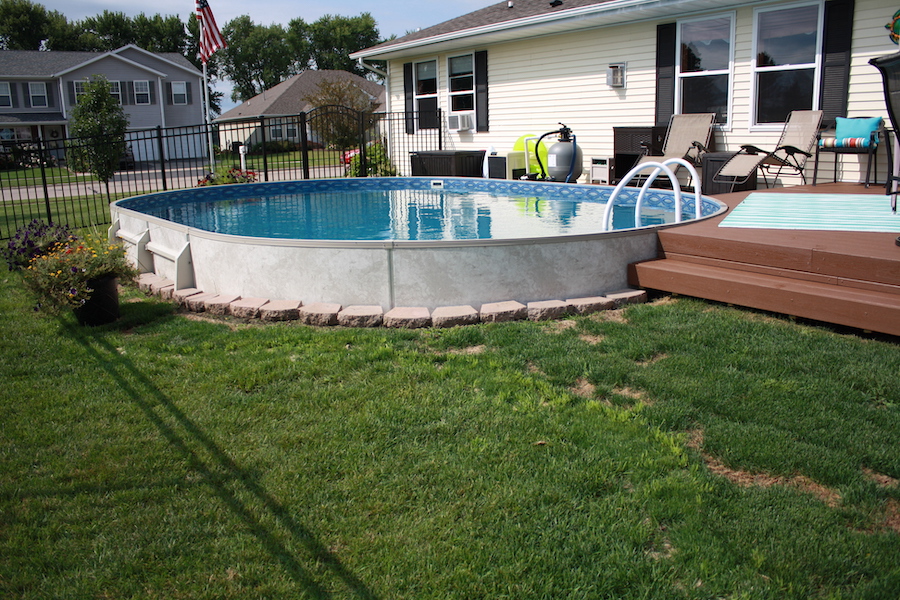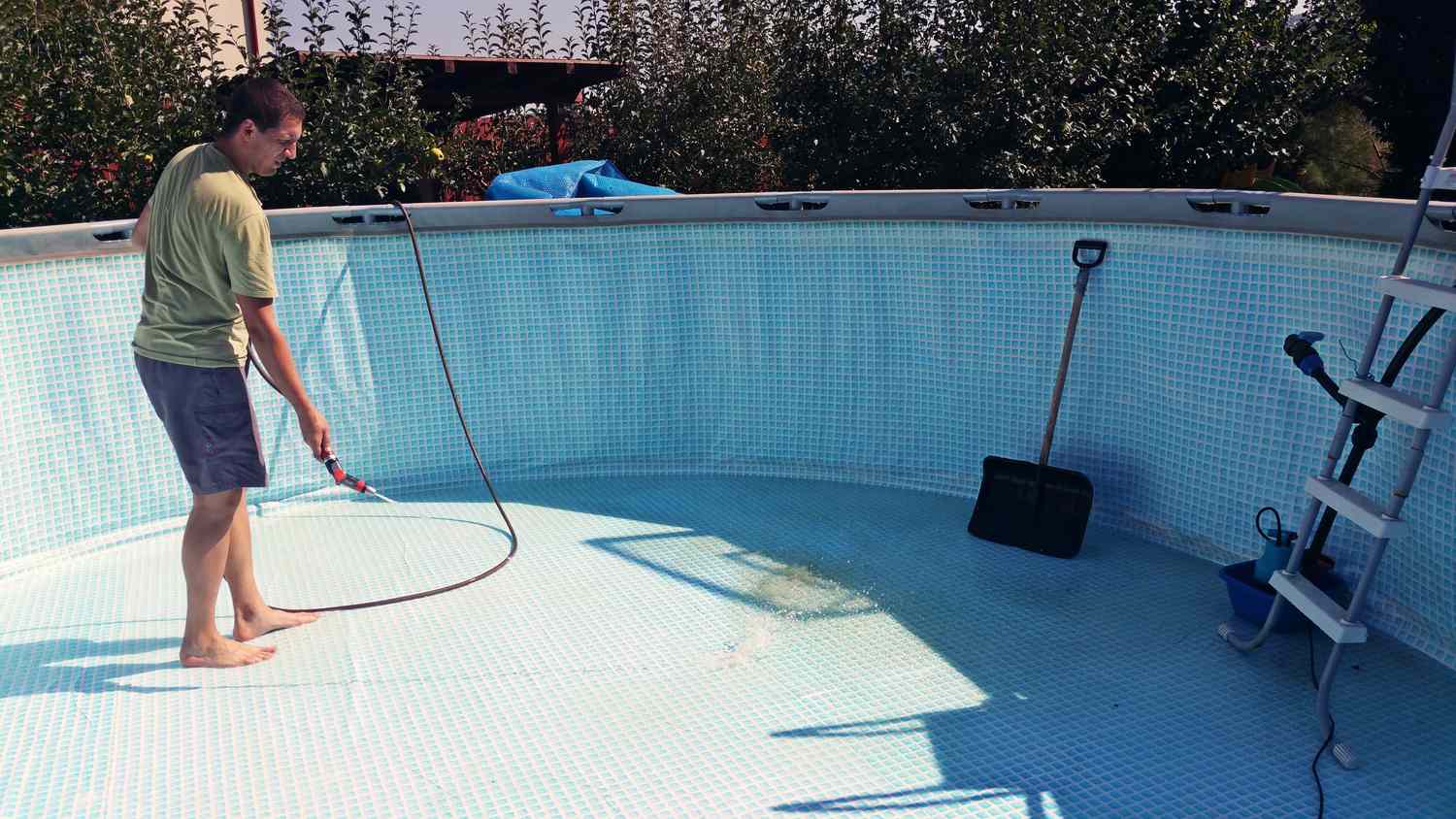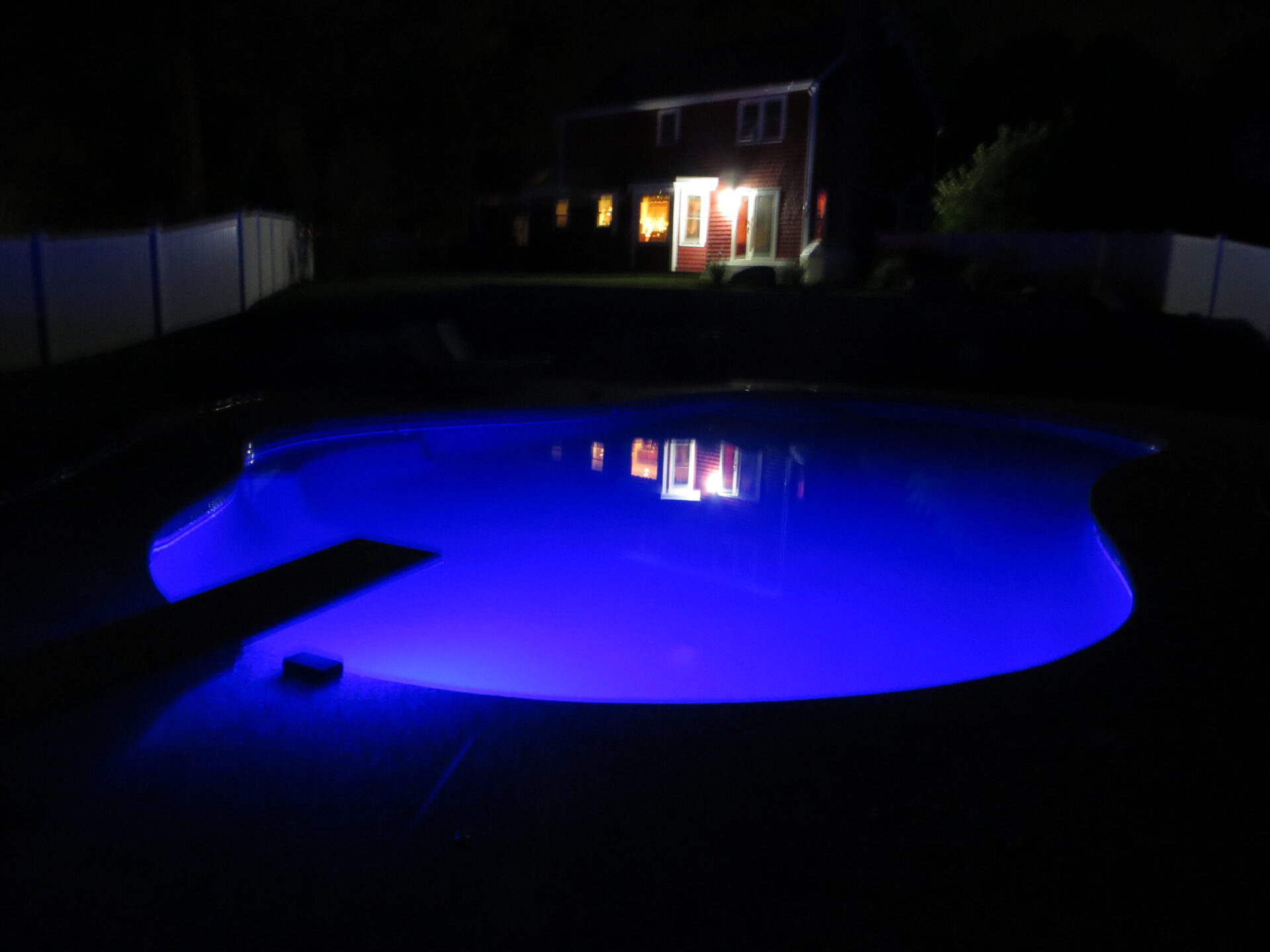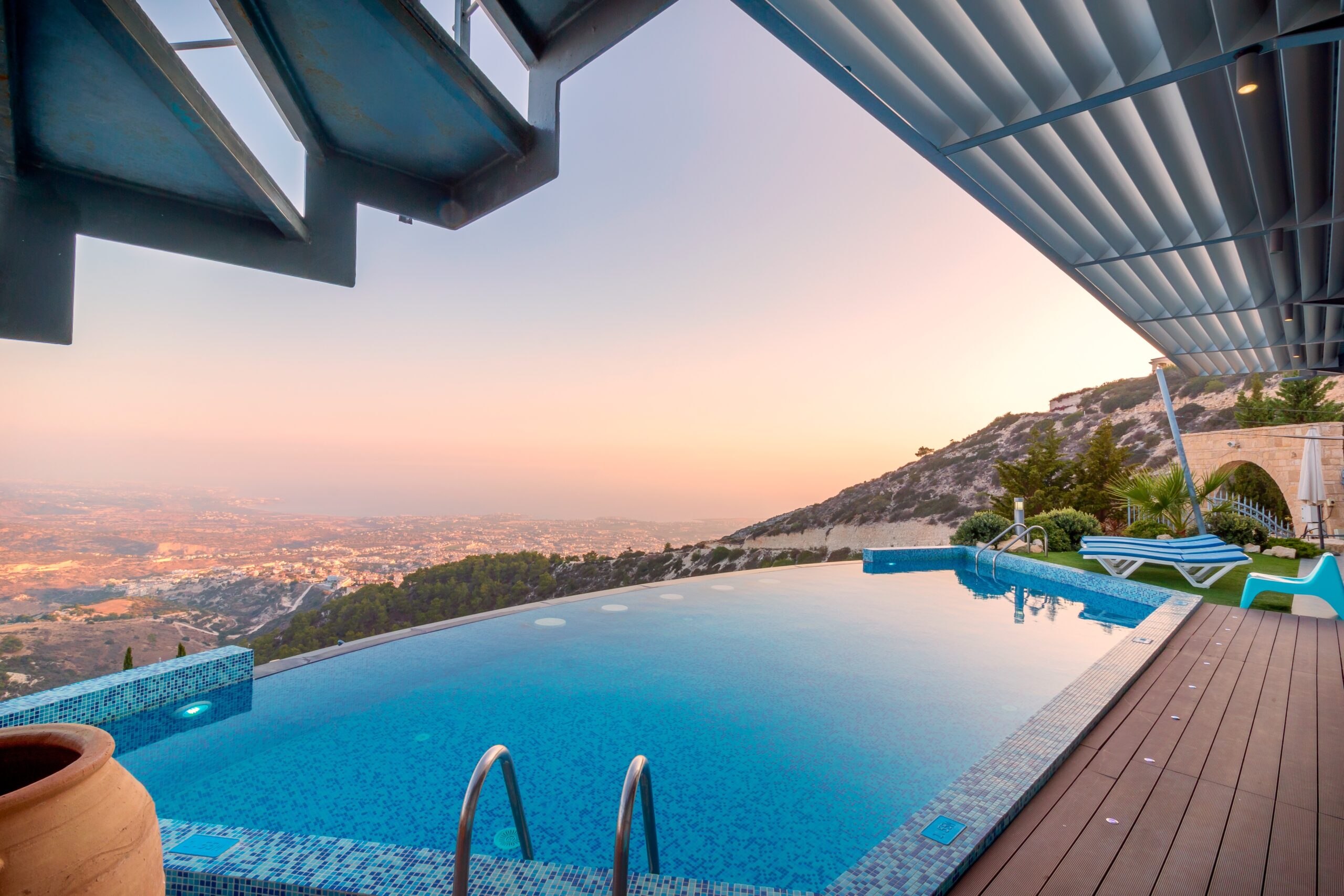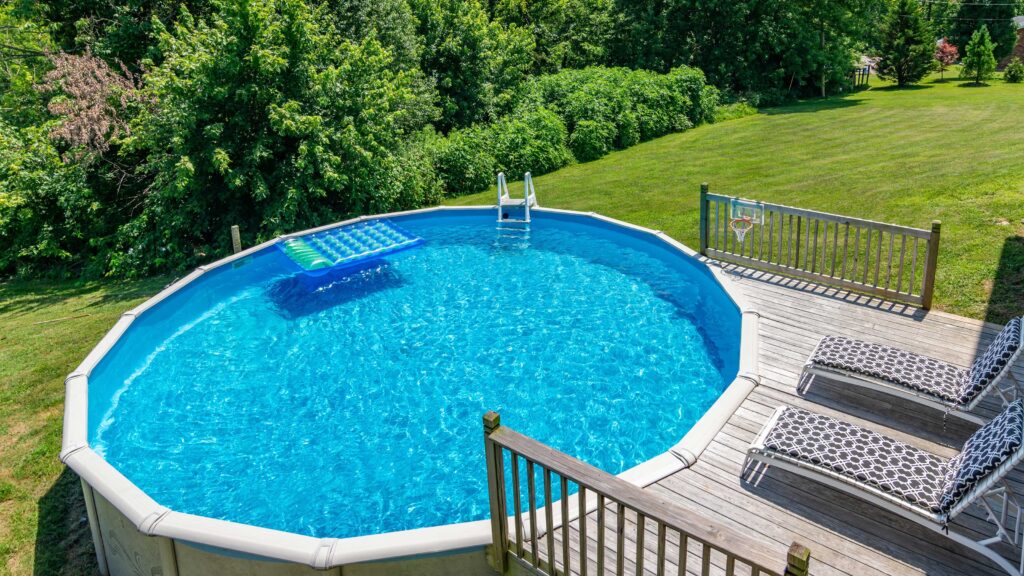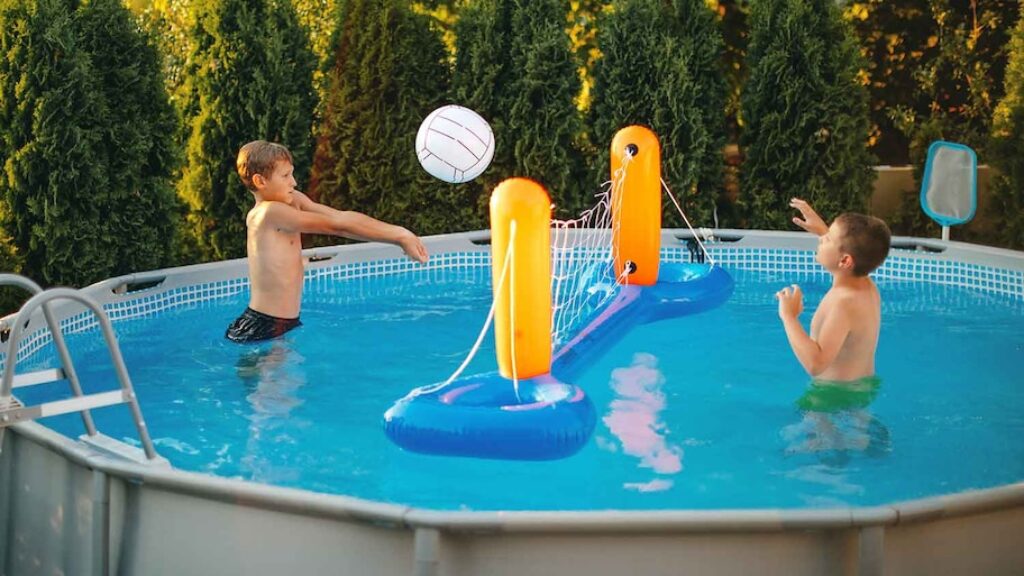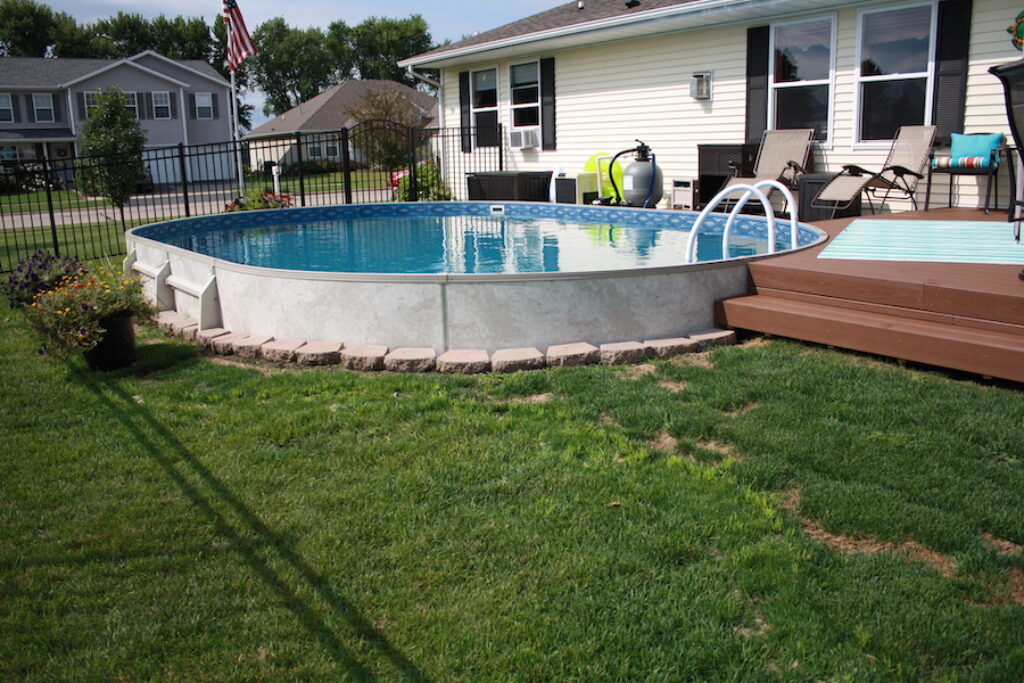Maintaining a crystal-clear above ground pool may seem like a daunting task, but with the right knowledge and a few simple steps, you can easily keep your pool water sparkling and inviting all season long. In this article, we will explore the key maintenance tips and tricks to ensure that your above ground pool remains a refreshing oasis for you and your family to enjoy. From balancing the chemicals to skimming debris, we’ve got you covered. So, let’s jump in and discover the secrets to keeping your above ground pool crystal clear!
Daily Maintenance
Skimming the Surface
One of the most important daily maintenance tasks for your above ground pool is skimming the surface. This involves using a long-handled net to remove any debris such as leaves, insects, and grass clippings that may have accumulated on the surface of the water. By regularly skimming the surface, you can prevent these contaminants from sinking to the bottom of the pool and causing water clarity issues.
Emptying the Skimmer Basket
In addition to skimming the surface, it is crucial to regularly empty the skimmer basket. The skimmer basket is located near the surface of the water and is designed to collect larger debris before it enters the pool’s filtration system. Neglecting to empty the skimmer basket can lead to reduced water flow and strain on the pool’s pump and filter, resulting in poor water quality. Therefore, make it a part of your daily routine to check and empty the skimmer basket.
Brushing the Walls
Another daily task to keep your above ground pool crystal clear is brushing the walls. Over time, algae and other contaminants can adhere to the pool walls, making them slippery and unsightly. By using a pool brush, you can effectively remove these deposits and prevent them from becoming a breeding ground for bacteria. It is recommended to brush the walls at least once a day, paying special attention to areas that are prone to algae growth, such as corners and behind ladders.
Checking and Adjusting the Water Chemistry
Proper water chemistry is essential for maintaining clear and safe pool water. Therefore, it is crucial to regularly check and adjust the water chemistry of your above ground pool. This involves testing the water for pH, chlorine levels, alkalinity, and other chemical parameters. Based on the test results, you may need to add chemicals like chlorine or pH adjusters to ensure that the water is properly balanced. By keeping the water chemistry within the recommended range, you can prevent issues like algae growth and cloudy water.
Running the Filtration System
The filtration system is the heart of any above ground pool, as it helps remove debris, bacteria, and other contaminants from the water. To keep your pool crystal clear, it is important to run the filtration system daily. The duration for running the filtration system may vary depending on the size and usage of your pool, but generally, it is recommended to run the system for at least 6-8 hours a day. This will ensure that the water is continuously circulated and filtered, resulting in improved water quality.
Weekly Maintenance
Vacuuming the Pool
In addition to daily skimming, vacuuming the pool is an essential part of weekly maintenance. While skimming removes surface debris, vacuuming helps eliminate dirt, dust, and other particles that have settled on the pool floor. There are different types of pool vacuums available, including manual and automatic options. Regardless of the type you choose, it is important to vacuum the pool regularly to keep the water clear and free from sediment.
Cleaning the Pool Filter
The pool filter plays a crucial role in removing impurities from the water, but it also needs regular cleaning to operate effectively. Depending on the type of filter you have (sand, cartridge, or diatomaceous earth), the cleaning process may vary. For sand filters, backwashing is typically required to flush out accumulated debris, while cartridge filters can be removed and rinsed with water. It is important to follow the manufacturer’s instructions when cleaning the pool filter to ensure proper maintenance and optimal filtration.
Shock Treatment
To effectively sanitize your above ground pool and eliminate contaminants, it is recommended to perform a shock treatment on a weekly basis. Shocking the pool involves adding a large dose of chlorine or a non-chlorine shock to the water to kill bacteria, algae, and other microorganisms. This process helps break down any organic matter and enhances the efficiency of your regular sanitizing routine. It is important to carefully follow the instructions on the shock treatment product and allow the water to circulate before using the pool again.
Testing the Water
Regularly testing the water is a crucial step in maintaining a crystal clear above ground pool. Weekly water testing allows you to monitor and adjust the chemical balance of the pool water as needed. Testing kits are readily available and typically include test strips or reagent drops to measure parameters such as pH, chlorine levels, alkalinity, and hardness. By tracking these values and making any necessary adjustments, you can ensure that your pool water remains clean, clear, and safe for swimming.
Adding Pool Chemicals
Based on the results of your water testing, you may need to adjust the chemical levels in your above ground pool by adding pool chemicals. This could involve adding chlorine to sanitize the water, pH adjusters to balance the acidity, or algaecides to prevent algae growth. It is important to carefully follow the instructions on the chemical product and avoid adding excessive amounts, as this can lead to imbalanced water chemistry. Regularly adding the appropriate pool chemicals will help maintain the clarity and quality of your pool water.
This image is property of cdn.mos.cms.futurecdn.net.
Monthly Maintenance
Inspecting the Pool Equipment
As part of your monthly pool maintenance routine, it is important to inspect the pool equipment. Check for any signs of wear or damage on items such as the pump, filter, heater, and pool ladder. Look for leaks, cracks, or loose connections and address any issues promptly to avoid further damage and ensure the proper functioning of your equipment. Regular inspection and maintenance of pool equipment will help prolong its lifespan and minimize the risk of unexpected breakdowns.
Backwashing the Pool Filter
While regular cleaning is important, it is also necessary to backwash your pool filter on a monthly basis. Backwashing is the process of reversing the water flow through the filter to remove trapped debris and ensure maximum filtration efficiency. Different types of filters have different settings and procedures for backwashing, so consult your filter’s manual for specific instructions. By incorporating backwashing into your monthly maintenance routine, you can keep your filter working optimally and maintain clean, clear water.
Checking the Pool Cover
If you have a pool cover, it is essential to include it in your monthly maintenance routine. Inspect the cover for any tears, holes, or signs of wear that may compromise its ability to keep debris out of the pool. Clean the cover as needed using a mild detergent and water, and make sure it is properly secured to withstand wind and weather. Regularly maintaining your pool cover will not only help keep your pool clean but also extend its lifespan.
Balancing the Pool Water
In addition to regular water testing, monthly maintenance should include a thorough check and adjustment of the pool water balance. This involves measuring the pH, alkalinity, calcium hardness, and other chemical levels to ensure they are within the recommended range. If any parameters are outside the optimal range, make the necessary adjustments using the appropriate pool chemicals. Properly balanced pool water is crucial for the comfort and safety of swimmers, while also preventing issues like scaling, corrosion, and cloudiness.
Seasonal Maintenance
Opening the Pool
When the warmer weather arrives and it’s time to open your above ground pool for the season, there are several steps you should follow to ensure a smooth and successful opening. Start by removing the pool cover, being careful to remove any debris that may have accumulated on top. Clean and dry the cover thoroughly before storing it. Next, inspect the pool for any damage or signs of wear, and address any issues promptly. Finally, begin the process of balancing the water chemistry and circulating the water to prepare the pool for swimming. By following a proper opening procedure, you can start the season with a clean and inviting pool.
Checking for Leaks
To keep your above ground pool in optimal condition, it is important to regularly check for leaks. Inspect the pool walls, floor, and connections for any signs of water loss or damage. Look for wet spots, damp soil, or a drop in the water level that cannot be attributed to evaporation. If you suspect a leak, it is best to consult a professional pool service provider who can accurately identify the source of the leak and perform the necessary repairs. Promptly addressing leaks will help conserve water, prevent further damage, and maintain the integrity of your pool.
Winterizing the Pool
When the swimming season comes to an end, it is crucial to properly winterize your above ground pool to protect it from the harsh winter conditions. Start by thoroughly cleaning the pool, removing any debris and ensuring the water quality is balanced. Lower the water level below the skimmer and remove any remaining water from the plumbing lines and equipment. Install a winter cover tightly to keep debris out and prevent the formation of ice. It is also recommended to add a winterizing chemical kit to prevent algae growth during the dormant period. Following these winterization steps will help safeguard your pool and make the opening process easier in the spring.
This image is property of media.angi.com.
Troubleshooting Common Issues
Cloudy Water
Cloudy water is a common issue that can be caused by various factors, including improper water balance, inadequate filtration, or the presence of organic matter. To troubleshoot cloudy water, start by testing and adjusting the water chemistry to ensure it is within the recommended range. Check and clean the pool filter to ensure optimal filtration. If necessary, consider using a clarifier or flocculant to help clear the water. Regular brushing, skimming, and maintaining a proper sanitizing routine will also contribute to clearer water.
Algae Growth
Algae are microscopic organisms that can rapidly multiply and cause green, slimy patches in your pool. To address algae growth, start by testing and adjusting the pH and chlorine levels to prevent further growth. Brush the affected areas vigorously to disrupt the algae colonies, and shock the pool with a high dose of chlorine to kill the algae. It may be necessary to use an algaecide specifically designed to eliminate and prevent algae growth. Regular maintenance, including brushing, skimming, and maintaining proper water chemistry, will help prevent future algae outbreaks.
Low or High pH Level
Maintaining the proper pH level in your above ground pool is crucial for swimmer comfort and water clarity. A low pH level can cause skin and eye irritation, while a high pH level can lead to scale formation and reduced chlorine effectiveness. To address low pH, add a pH increaser to raise the levels. If the pH is too high, use a pH reducer. Regularly test the water and make any necessary adjustments to keep the pH within the recommended range. The ideal pH for pool water is typically between 7.4 and 7.6.
Clogged Pool Filter
A clogged pool filter can result in inadequate water circulation and reduced filtration efficiency. If you notice a decrease in water flow or pressure, it may indicate a clogged filter. The steps to address a clogged pool filter will depend on the type of filter you have. For sand filters, backwashing is typically required to remove trapped debris. Cartridge filters can be cleaned by removing and rinsing the cartridges with a hose. If the filter is severely clogged, it may need to be replaced. Regularly cleaning and maintaining the pool filter will help ensure optimal performance and water clarity.
Pool Leak
Pool leaks can be a frustrating and costly issue to deal with. Symptoms of a pool leak may include a noticeable drop in water level, wet spots around the pool, or constantly running pool equipment. To confirm if a leak is present, perform a simple bucket test by measuring the water loss over a specified period with the pool equipment turned off. If a leak is detected, it is best to contact a professional pool service provider who can accurately identify and repair the leak. Promptly addressing pool leaks will help conserve water, prevent further damage, and maintain the structural integrity of your pool.
Choosing the Right Pool Products
Pool Testing Kit
A reliable pool testing kit is an essential tool for any pool owner. It allows you to easily and accurately measure the chemical parameters of your pool water, such as pH, chlorine levels, alkalinity, and hardness. When choosing a pool testing kit, opt for one that provides accurate results and is easy to use. Consider whether you prefer test strips or liquid reagents and ensure the kit includes all the necessary tests for your specific needs.
Pool Chemicals
There are a variety of pool chemicals available to help maintain water clarity and balance. These may include chlorine, pH adjusters, alkalinity increasers or decreasers, and algaecides. When selecting pool chemicals, choose high-quality products from reputable brands. Follow the instructions carefully to achieve the desired results and avoid adding excessive amounts of chemicals. Store pool chemicals in a cool, dry place, out of reach of children and pets.
Pool Vacuum
Pool vacuums are essential for removing dirt, debris, and sediment that have settled on the pool floor. There are manual and automatic pool vacuum options available to suit different needs and budgets. Consider factors such as the size of your pool, the type and amount of debris, and your preferred method of operation when choosing a pool vacuum. Look for features like adjustable suction power, easy maneuverability, and durable construction.
Pool Skimmer
A pool skimmer is an important component of a well-maintained above ground pool. It helps remove debris from the water before it sinks to the bottom or clogs the pool filter. When selecting a pool skimmer, choose one that is compatible with your pool’s size and filtration system. Look for skimmers with a large capacity and easy-access design for quick and efficient cleaning.
Pool Cover
A high-quality pool cover is essential for protecting your above ground pool when it is not in use. It helps keep debris out of the pool, prevents evaporation, and reduces the risk of algae growth. When choosing a pool cover, consider factors such as durability, proper fit, and ease of installation. Opt for a cover made of weather-resistant materials that can withstand exposure to the elements.
This image is property of www.swimmingpool.com.
Safety Measures
Pool Fence
Installing a pool fence is an important safety measure to prevent unauthorized access to your above ground pool. A pool fence acts as a physical barrier, keeping young children, pets, and wildlife away from the water. Ensure the fence is at least four feet high, has a lockable gate, and complies with local safety regulations. Regularly inspect the fence for any damage or gaps that may compromise its effectiveness.
Pool Alarms
Pool alarms are an additional layer of protection to enhance pool safety. There are different types of pool alarms available, including surface wave alarms, gate alarms, and wearable alarms. These devices can detect movement or changes in water pressure and emit a loud alert to notify you of any potential danger. Consider your specific needs and requirements when choosing a pool alarm system.
Proper Chemical Handling
Proper chemical handling is crucial for the safety of both the pool owner and swimmers. Always read and follow the instructions provided with pool chemicals, including wearing appropriate protective gear such as gloves and goggles. Avoid mixing different chemicals together unless explicitly instructed to do so. Store pool chemicals in their original containers, away from direct sunlight and in a secure location out of reach of children and pets.
Proper Electrical Wiring
If your above ground pool has electrical components such as pumps, filters, or lights, it is important to ensure proper electrical wiring for safety. Seek the assistance of a licensed electrician to ensure that the electrical connections are correctly installed and comply with local electrical codes. Periodically inspect the wiring for any signs of damage or fraying, and promptly address any issues to avoid electrical hazards.
Maximizing Pool Lifespan
Regulating Pool Usage
One way to maximize the lifespan of your above ground pool is by regulating its usage. Avoid overcrowding the pool or exceeding its recommended capacity, as this can put excessive strain on the pool structure, filter, and other equipment. Encourage proper pool etiquette, such as refraining from diving in shallow areas and avoiding rough play that may damage the pool liner. By practicing responsible pool usage, you can extend the lifespan of your pool and minimize the risk of accidents or damage.
Proper Water Balance
Maintaining proper water balance is essential for the longevity of your above ground pool. A well-balanced pool with the correct pH, alkalinity, and calcium hardness levels reduces the risk of scale formation, staining, and corrosion. Regularly test the water and make any necessary adjustments to keep the chemical levels within the recommended range. Avoid excessive chemical use, as this can lead to imbalances and damage the pool equipment.
Regular Equipment Maintenance
Regular maintenance of your pool equipment can significantly extend its lifespan and ensure optimal performance. This includes inspecting and cleaning the pump, filter, heater, and other components on a regular basis. Remove any debris or clogs that may obstruct the equipment’s functioning, and address any issues promptly. It is also recommended to have your equipment professionally serviced at least once a year to detect and prevent potential problems.
Proper Cleaning Techniques
Using proper cleaning techniques is essential for maintaining the integrity and appearance of your above ground pool. Avoid using harsh chemicals or abrasive cleaning tools that may cause damage to the pool liner or surfaces. Instead, use soft-bristle brushes and mild cleaning agents to remove dirt and stains. Regularly skim the surface, brush the walls, and vacuum the pool to prevent the buildup of debris and prolong the lifespan of your pool.
This image is property of www.swimmingpool.com.
The Importance of Professional Services
Professional Pool Cleaning
While regular maintenance tasks can be performed by the pool owner, there are several benefits to hiring professional pool cleaning services. Professional pool cleaners have the expertise, experience, and specialized equipment to thoroughly clean and maintain your above ground pool. They can ensure that all aspects of pool maintenance, from water chemistry to equipment inspection, are carried out correctly. By entrusting your pool to professionals, you can save time and ensure that your pool receives the highest level of care.
Equipment Repair and Maintenance
In addition to routine maintenance, professional pool service providers can also handle equipment repair and maintenance. Whether your pump needs a replacement part or your filter requires troubleshooting, trained technicians can quickly diagnose and address equipment issues. Regular professional maintenance of your pool equipment can help prevent unexpected breakdowns, extend the equipment’s lifespan, and ensure optimal performance.
Pool Opening and Closing
Opening and closing an above ground pool can be a time-consuming and meticulous process. By hiring professional pool services for pool opening and closing, you can ensure that each step is performed correctly and efficiently. Professionals have the knowledge and experience to balance the water chemistry, inspect the equipment, remove and store the pool cover, and prepare the pool for the upcoming season. Professional pool opening and closing services save you the hassle of tackling these tasks on your own and ensure that your pool is ready for enjoyment.
Conclusion
Regular and proper maintenance is the key to keeping your above ground pool crystal clear and enjoyable throughout the swimming season. By following a comprehensive maintenance routine, which includes skimming the surface, brushing the walls, regularly cleaning the pool filter, balancing the water chemistry, and running the filtration system, you can minimize issues such as cloudy water, algae growth, and pH imbalances. Additionally, by incorporating weekly, monthly, and seasonal maintenance tasks, as well as troubleshooting common issues and implementing safety measures, you can maximize the lifespan of your above ground pool. While routine maintenance can be performed by the pool owner, the expertise of professional pool services can further enhance the care of your pool, including professional cleaning, equipment repair and maintenance, and pool opening and closing services. By combining regular maintenance with the right pool products and safety measures, you can enjoy a crystal clear above ground pool for years to come.
